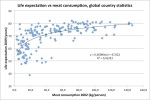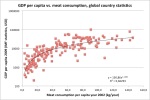There are seven billion humans on Earth – and 1.3 billion cows.
One person passes gas normally 0.5 – 2 liters per day. There is 0-10% (even up to 26%) methane in the gas. So, let’s assume I have a normal day without too much gas producing food: I create one liter of gas with 6% methane content, or 0.06 liter of pure methane during one day. Let’s also assume that each and every human on Earth eats and reacts the same way. This means that globally we pass something like 400 million liters methane every day.
One cow is estimated to burp 100-400 liters methane per day when it ruminates. The hundreds of millions cows emit maybe 400 billion liters methane per day. That is thousand (1000) times the amount we humans are passing.

Cows in the street of New Delhi. India has the largest cattle population in the world, but their meat consumption is one of the lowest, only 5 kg per person per year.
So what?
It’s about global warming.
Methane (CH4) is over 20 times more effective as a greenhouse gas than carbon dioxide (CO2). Cows are estimated to count of up to 25%, even 37% of the global greenhouse gas human-induced methane emissions, that is as much as we are producing by burning fossil fuels. Scientist and farmers are jointly trying to find ways to reduce this.
Again, so what?
- Human methane emissions have an insignificant role in greenhouse effect.
- Sill, humans cause indirectly more than 60% of all methane emissions: using fossil fuels, rice cropping, landfilling and burning biomass. That is important.
- Cows’ methane emissions are an important reason for greenhouse effect. Also, cattle farming is increasing the deforestation of the tropical rain forests (Brazil has the second largest cattle population in the world), thus accelerating the global warming.
- People in Denmark – or New Zealand or USA – eat 50 times more meat than people in Bhutan or 30 times more than in India or in Congo. (They also live 10-25 year longer. But do they live longer due their meaty diet? Probably not. They just can afford to eat more meat due to their higher standard of living (GDP per capita). There are other factors like good healthcare, and overall better nutrition than in the countries where life expectation is lower.) – This means that the people in the countries who eat more, are indirectly contributing more to the global warming as well.
Question is: should we eat less meat to help – even with a tiny amount – the prevention of greenhouse effect and global warming?
For the statistics lovers, here are a couple graphs (click for larger).


You say: “Cows are estimated to count of up to 25% of the global greenhouse gas emissions”.
According to the source you quote though, and in turn the CSIRO report, they are responsible for 25% of the anthropogenic methane emissions. That’s still huge, but not as big as what you say it is. On the other hand, cattle raising has impacts other than the methane emissions.
This is worth a look: http://www.fao.org/newsroom/en/news/2006/1000448/index.html
Thanks Andrew for the correction.
Your note about the other – direct and indirect – impacts of livestock is absolutely something to be followed, even worried about.
Most interesting.There appears to be some anomalies in the graphs, where heavy meat eaters sometimes live longer and sometimes not, the same with GDP, some poor countries eating lots of meat. Perhaps the greatest problem is the deforestation and water consumption that animal farming requires. something like a thousand litres of water for every kilo of meat produced. And the dreadful flooding we are seeing everywhere is due in part to deforestation as well as to climate change.
Right observation, thanks rigbyte. I agree, we can not say that meat eating per se is THE important factor, but and indication of something more profound.
Very interesting article! Thanks. ~Sherry~
Thanks Sherry for your feedback!